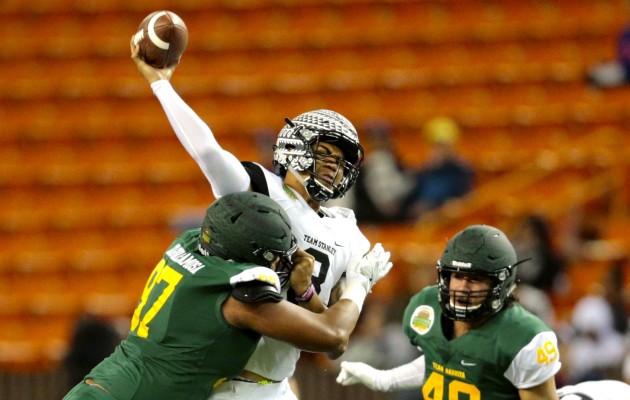
Sorry quarterbacks out there, but you’re not quite as protected as it seemed.
Many eyebrows were raised when the NFHS put out a press release last week regarding new rule changes for the 2017 football season.
In the release, the rules committee expanded on the rule regarding what is considered a defenseless player by adding specific examples. The first one, which read, “a) A player in the act of or just after throwing a pass,” caught a lot of people off guard.
HHSAA Football Officials Coordinator Matt Sumstine said Wednesday that nothing will change regarding the enforcement of the rules concerning a defenseless player.
“The defenseless player list they came up with is just putting in writing what is already practiced,” Sumstine said. “They are just trying to clarify a rule that is already in existence, but instead it creates confusion.”
“There is no physical change in the applications of what (referees) will be doing. There’s no change in how we will apply the rules in those situations because they are already being officiated that way and have been for many years.”
Sumstine said the most significant change nationally is the blindside block rule. However, that rule has already been enforced in Hawaii for the past two years.
“(Hawaii) and Oregon were the two states that changed that rule (two years ago) and we’re the only two states that have already been enforcing that rule,” Sumstine said.
He went on to elaborate on the rule changes, saying there wasn’t anything really significant that stood out to him.
One change he liked is how a defensive player will now be allowed to face-guard a receiver without being called for pass interference.
Also, in the last two minutes of the second quarter or the game, if a penalty is committed that stops the clock, the offended team can choose whether to keep the clock stopped or let it continue to run.
“Now it’s a coaches decision instead of being left up to the officials,” Sumstine said.
One area the game will certainly change is when a team is trailing late in the game. Pop-up kicks will no longer be allowed, so teams trying to get the ball back on a kickoff will either have to squib it or pooch-kick it into an open area.
Thank you, some clarity at least. The faceguarding will definitely make it harder for receivers now. No issues with the “popup” kick, should cut down on the headhunting.